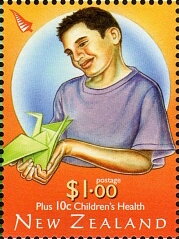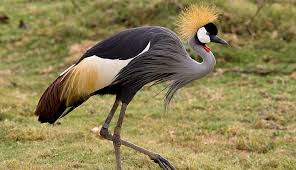Stamp: Health - Boy Holding Crane $1 + 10c (New Zealand 2007)
Health - Boy Holding Crane $1 + 10c (New Zealand 2007)
05 September (New Zealand ) within release Children's Health. Peaceful World goes into circulation Stamp Health - Boy Holding Crane $1 + 10c face value 1+0.10 New Zealand dollar
| Stamp Health - Boy Holding Crane $1 + 10c in catalogues | |
|---|---|
| Michel: | Mi: NZ 2454C |
| Unificato: | Un: NZ 2510A |
Stamp is vertical format.
From Souvenir SheetAlso in the issue Children's Health. Peaceful World:
- Stamp - Health - Boy Holding Crane $1 + 10c face value 1+0.10;
- Stamp - Health - Girl & Dove 50c + 10c face value 50+10;
- Stamp - Health - Girls & Peace Lily 50c + 10c face value 50+10;
- Stamp with Collectible Margin - Health - Peace Lily - Sheet Header face value 4*(50+10);
- Stamp - Health - Peace Lily 50c + 10c face value 50+10;
- Stamp - Health - Peace Lily 50c +10c - Coil Issue face value 50+10;
- Souvenir Sheet - Health 2007 Peaceful World souvenir sheet - perf 14 face value 2+0.30;
Stamp Health - Boy Holding Crane $1 + 10c it reflects the thematic directions:
Biologically, a child (plural: children) is a human being between the stages of birth and puberty. The legal definition of child generally refers to a minor, otherwise known as a person younger than the age of majority. Child may also describe a relationship with a parent (such as sons and daughters of any age) or, metaphorically, an authority figure, or signify group membership in a clan, tribe, or religion; it can also signify being strongly affected by a specific time, place, or circumstance, as in "a child of nature" or "a child of the Sixties". There are many social issues that affect children, such as childhood education, bullying, child poverty, dysfunctional families, child labor, hunger, and child homelessness. Children can be raised by parents, by fosterers, guardians or partially raised in a day care center.
Cranes are a type of large bird with long legs and necks in the biological family Gruidae of the order Gruiformes. The family has 15 species placed in four genera which are Antigone, Balearica, Leucogeranus, and Grus. They are large birds with long necks and legs, a tapering form, and long secondary feathers on the wing that project over the tail. Most species have muted gray or white plumages, marked with black, and red bare patches on the face, but the crowned cranes of the genus Balearica have vibrantly-coloured wings and golden "crowns" of feathers. Cranes fly with their necks extended outwards instead of bent into an S-shape and their long legs outstretched.



